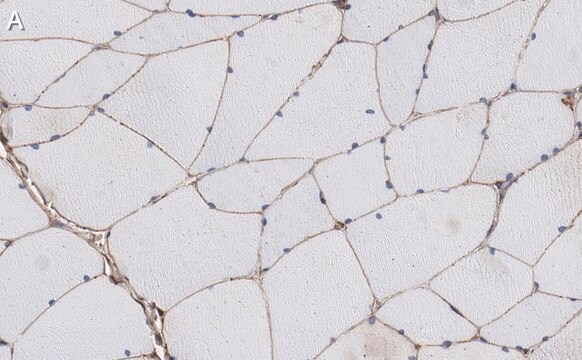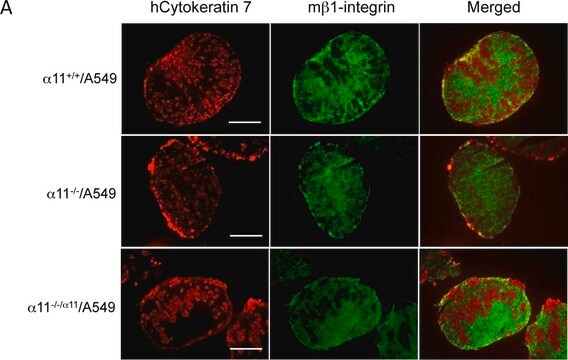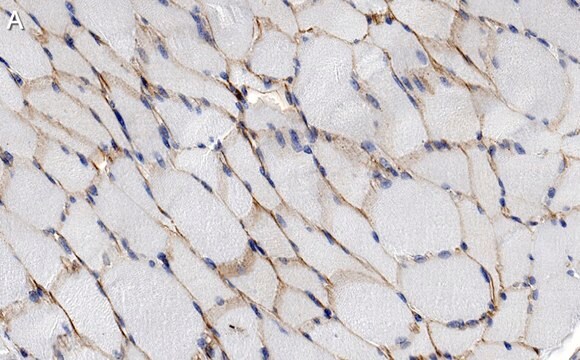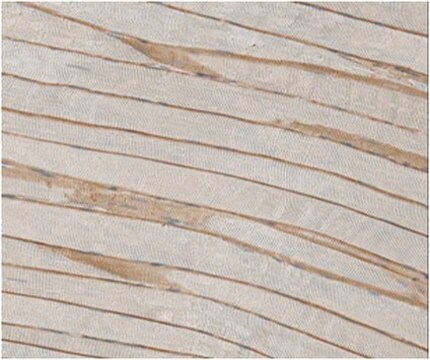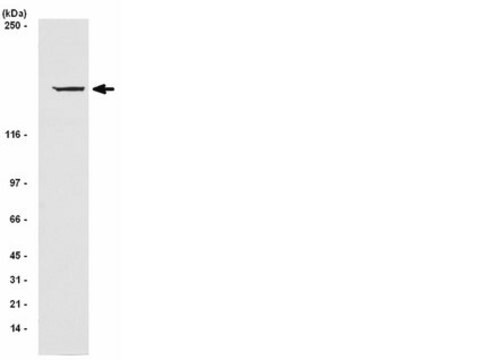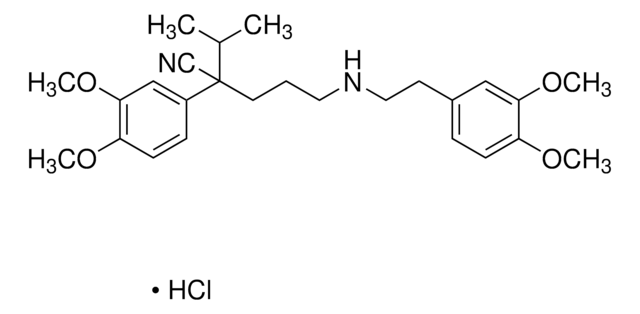추천 제품
생물학적 소스
mouse
Quality Level
항체 형태
culture supernatant
항체 생산 유형
primary antibodies
클론
VIA4-1, monoclonal
종 반응성
guinea pig, rabbit, rat, human, mouse, canine
제조업체/상표
Upstate®
기술
immunohistochemistry: suitable
western blot: suitable
동형
IgG1
NCBI 수납 번호
UniProt 수납 번호
배송 상태
wet ice
타겟 번역 후 변형
unmodified
유전자 정보
human ... DAG1(1605)
일반 설명
Dystroglycan is one of the dystrophin-associated glycoproteins, which is encoded by a 5.5 kb transcript in Homo sapiens by chromosome 3. There are two exons that are separated by a large intron. The spliced exons codes for a protein product is finally cleaved into two non-covalently associated subunits, α (N-terminal) and β (C-terminal). In skeletal muscle the dystroglycan complex works as a transmembrane linkage between the extracellular matrix and the cytoskeleton. α-dystroglycan is extracellular and binds to merosin (α-2 laminin) in the basement membrane, while β-dystroglycan is a transmembrane protein and binds to dystrophin, which is a large rod-like cytoskeletal protein, absent in Duchenne muscular dystrophy patients. Dystrophin binds to intracellular actin cables. In this way, the dystroglycan complex, which links the extracellular matrix to the intracellular actin cables, is thought to provide structural integrity in muscle tissues. The dystroglycan complex is also known to serve as an agrin receptor in muscle, where it may regulate agrin-induced acetylcholine receptor clustering at the neuromuscular junction. There is also evidence that suggests the function of dystroglycan as a part of the signal transduction pathway because it is shown that Grb2, a mediator of the Ras-related signal pathway, can interact with the cytoplasmic domain of dystroglycan. In general, aberrant expression of dystrophin-associated protein complex underlies the pathogenesis of Duchenne muscular dystrophy, Becker muscular dystrophy and severe childhood autosomal recessive muscular dystrophy. Interestingly, no genetic disease has been described for either α- or β-dystroglycan.
Dystroglycan is widely distributed in non-muscle tissues as well as in muscle tissues. During epithelial morphogenesis of kidney, the dystroglycan complex is shown to act as a receptor for the basement membrane. Dystroglycan expression in Mus musculus brain and neural retina has also been reported. However, the physiological role of dystroglycan in non-muscle tissues has remained unclear.
Dystroglycan is widely distributed in non-muscle tissues as well as in muscle tissues. During epithelial morphogenesis of kidney, the dystroglycan complex is shown to act as a receptor for the basement membrane. Dystroglycan expression in Mus musculus brain and neural retina has also been reported. However, the physiological role of dystroglycan in non-muscle tissues has remained unclear.
Note: This product may be used for research purposes only. Diagnostic use of this product requires a license from the University of Iowa Research Foundation, 214 Technology Innovation Center, Iowa City, IA 52242.
특이성
Recognizes α-dystroglycan/LARGE-glycan.
면역원
Rabbit skeletal muscle membrane preparation
애플리케이션
Detect α-Dystroglycan using this Anti-α-Dystroglycan Antibody, clone VIA4-1. This antibody has been published and validated for use in IH and WB.
Research Category
Cell Structure
Cell Structure
Research Sub Category
Cytoskeleton
Cytoskeleton
품질
routinely evaluated on rabbit skeletal muscle in a western blot.
표적 설명
156 kDa
물리적 형태
Culture supernatant containing 0.05% sodium azide.
Unpurified
저장 및 안정성
Maintain for 2 years at -20°C from date of shipment. Aliquot to avoid repeated freezing and thawing. For maximum recovery of product, centrifuge the original vial after thawing and prior to removing the cap.
분석 메모
Control
Mouse, rat and human skeletal muscle tissue extracts or DU 145 (human prostate carcinoma tumor) cell lysate
Mouse, rat and human skeletal muscle tissue extracts or DU 145 (human prostate carcinoma tumor) cell lysate
기타 정보
Concentration: Please refer to the Certificate of Analysis for the lot-specific concentration.
법적 정보
UPSTATE is a registered trademark of Merck KGaA, Darmstadt, Germany
면책조항
Unless otherwise stated in our catalog or other company documentation accompanying the product(s), our products are intended for research use only and are not to be used for any other purpose, which includes but is not limited to, unauthorized commercial uses, in vitro diagnostic uses, ex vivo or in vivo therapeutic uses or any type of consumption or application to humans or animals.
적합한 제품을 찾을 수 없으신가요?
당사의 제품 선택기 도구.을(를) 시도해 보세요.
Storage Class Code
12 - Non Combustible Liquids
WGK
WGK 2
시험 성적서(COA)
제품의 로트/배치 번호를 입력하여 시험 성적서(COA)을 검색하십시오. 로트 및 배치 번호는 제품 라벨에 있는 ‘로트’ 또는 ‘배치’라는 용어 뒤에서 찾을 수 있습니다.
Mechanistic distinctions between agrin and laminin-1 induced aggregation of acetylcholine receptors.
Lara K Lee et al.
BMC neuroscience, 3, 10-10 (2002-08-17)
One of the earliest steps in synaptogenesis at the neuromuscular junction is the aggregation of nicotinic acetylcholine receptors at the postsynaptic membrane. This study presents quantitative analyses of receptor and alpha-Dystroglycan aggregation in response to agrin and laminin-1, alone or
Ernesto Pavoni et al.
The open neurology journal, 5, 68-74 (2011-11-03)
The dystroglycan (DG) expression pattern can be altered in severe muscular dystrophies. In fact, some congenital muscular dystrophies (CMDs) and limb-girdle muscular dystrophies (LGMDs) are caused by point mutations identified in six glycosyltransferase genes which are likely to target different
Belén Prados et al.
The American journal of pathology, 170(5), 1659-1668 (2007-04-26)
Walker-Warburg syndrome (WWS) is the most severe of a group of congenital disorders that have in common defects in the O-glycosylation of alpha-dystroglycan. WWS is characterized by congenital muscular dystrophy coupled with severe ocular and brain malformations. Moreover, in at
Deficiency of a glycoprotein component of the dystrophin complex in dystrophic muscle.
Ervasti, J M, et al.
Nature, 345, 315-319 (1990)
Dystrophin constitutes 5% of membrane cytoskeleton in skeletal muscle.
Ohlendieck, K and Campbell, K P
Febs Letters, 283, 230-234 (1991)
자사의 과학자팀은 생명 과학, 재료 과학, 화학 합성, 크로마토그래피, 분석 및 기타 많은 영역을 포함한 모든 과학 분야에 경험이 있습니다..
고객지원팀으로 연락바랍니다.